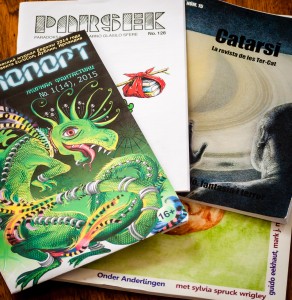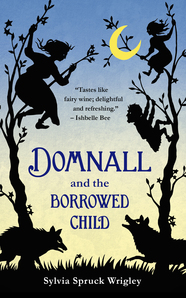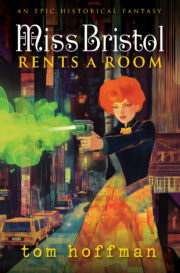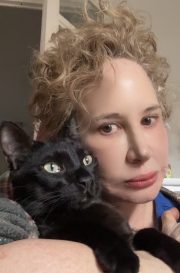Non-English Markets Near and Far
There are lots of reasons to submit to publications in non-English speaking countries. Let me start of with a dose of honesty: money isn’t one of them. And yet, they are one of my favourite markets to tackle.
I can pretend to be all professional and say submitting to them is part of a plan to build up a new audience or to use such sales to support selling foreign rights for my still-in-progress novel. But the truth is, I do it because it’s cool to see what my story looks like in another language. My friends and family agree. While most have no idea of the difference between SFWA-qualifying and for-the-luv markets, they are excited if my story appears in French, Estonian, or Portuguese.
Don’t get me wrong: I’m not advocating building a career strategy based on Facebook likes, but it’s really nice to have Great Aunt Bernice telling everyone about my latest publication instead of just raising her eyebrows quizzically and asking me why I don’t write about normal things.
The key to breaking foreign markets is an amazing website by Canadian author, Douglas Smith. Smith created and maintains the Foreign-Language Market List (FML), a directory of publications around the world which take submissions and explains, in plain English, what they are looking for.
This website contains dozens of publications which are happy to accept unsolicited submissions. Smith has a mailing list in which authors like me can report new markets or the closure of an old one. In addition, many of the editors are in direct contact with him and keep him up-to-date with what they are looking for.
So the hard work is already done. All you have to do is submit.
It’s super easy.
Step 1: Pick a story, any story.
I am leery of giving away first rights so I only offer reprints. Always check your contract. Generally speaking, you’ll find that your contracts include first-rights and an English exclusive but have no hold on other language rights. If so, you can take those stories and sell the reprints, one-per-language all over the world. With some contracts, you may need to wait for those rights to revert to you.
Step 2: Pick a market.
Look for the markets that have a green $$$ or YES next to them, which means the market has been confirmed as a valid market which accepts unsolicited submissions.
I believe in Yog’s law: money must always flow to the writer. But I also believe in this big old wide world out there that I’d like to be a bigger part of, that I’d like to contribute to. So if it looks good and has good fiction and also includes local fiction by local writers, I’m happy with a contributor’s copy as payment. I’m happier still if the translator gets paid.
 The Foreign-Language Market List is sorted by country but your limiting factor for selling rights is by language. None of the publications mention whether they will accept simultaneous submission; I always consider it safer to assume they don’t. So I choose one publication per language to submit my story to, in order to avoid the dreaded sim-sub. Just to be perfectly clear: that’s one submission per language, not one submission for country.
The Foreign-Language Market List is sorted by country but your limiting factor for selling rights is by language. None of the publications mention whether they will accept simultaneous submission; I always consider it safer to assume they don’t. So I choose one publication per language to submit my story to, in order to avoid the dreaded sim-sub. Just to be perfectly clear: that’s one submission per language, not one submission for country.
Step 3: Write a cover letter.
Writing to the editor in English is fine and many people simply use their standard cover letter.
Here’s a template that I use for my submissions.
Dear [EDITORNAME]
I found your publication on Douglas Smith’s Foreign-Language Market List, which says that you accept stories in English.
I have attached my short story, [STORY
NAME] for your consideration.This [GENRE] story is [XX] words and was originally published in [FIRSTPUBLICATION] on [DATE].
I would be thrilled to see a translation of this piece into [LANGUAGE].
[1-3 LINE BIOGRAPHY].
Thanks,
[YOURNAME]
I avoid using the publication language unless I am very confident and I never, ever use Google translate.
Step 4: Check the market again and make sure you are the right genre and send off your submission!
Step 5: Forget about it.
I dabble in rejectomancy, but in this case, I really don’t watch these submissions waiting for a response. Some of the markets read all the submissions once a year and make their decision. Other ones only respond if they are interested. I once was contacted to say my story had been translated three years after my original submission.
The thing to remember is that most of these magazines are put together by fans who are doing it for a love of speculative fiction and a desire to share stories. In some instances, they are a playground for translators who wish to improve their portfolios. None of them has any sort of decent funding and it can sometimes take a very long time for the editor, the translator and the artists to all complete their work.
I track my submissions with a very quick spreadsheet that shows the story name, the market, the language, the date sent and a free slot for response, if any. Six months later, if I haven’t heard back, I will consider the story free to submit to other markets in the same language. If I do get an acceptance, I treat it as a sim-sub and write to any other markets that publish in the same language, to let them know the story is no longer available. To be honest, it has never been a problem. The story that took three years (the editor unexpectedly got a divorce and put the magazine on hold) was in a Galician publication, so there wasn’t any competition.
And that’s it! Every few months, on a rainy sad afternoon or a hungover morning, I get out my spreadsheet and send out a batch of stories. It’s easy to get a dozen submissions out at a time and see what happens. In the meantime, I’ve been translated into over twelve languages (a mere upstart compared to most of the people on Douglas Smith’s mailing list) and have started regular correspondence with a couple of the editors.
•••
 Sylvia Spruck Wrigley’s first long work, Domnall and the Borrowed Child, is now available from Tor.com.
Sylvia Spruck Wrigley’s first long work, Domnall and the Borrowed Child, is now available from Tor.com.
Sylvia was born in Germany and spent her childhood in Los Angeles. She emigrated to Scotland where she guided German tourists around the Trossachs and searched for the supernatural. She now splits her time between South Wales and Andalucia where she writes about plane crashes and faeries, which have more in common than most people might imagine. Her fiction was nominated for a Nebula in 2014 and her short stories have been translated into over a dozen languages.



